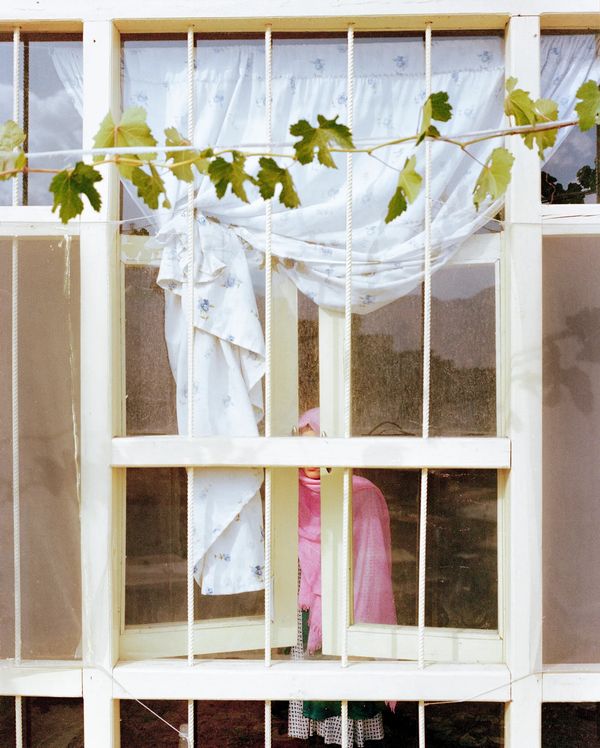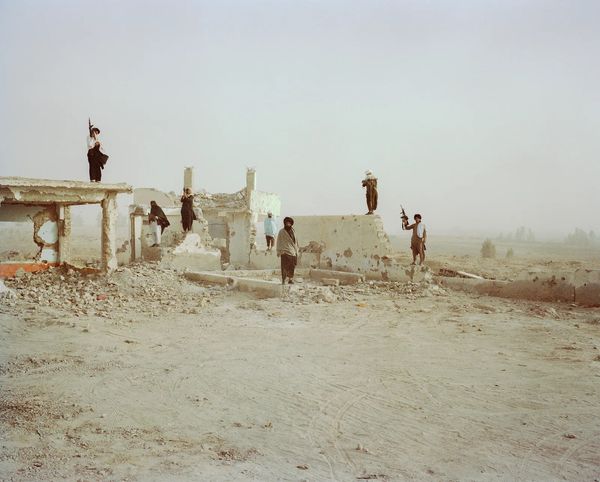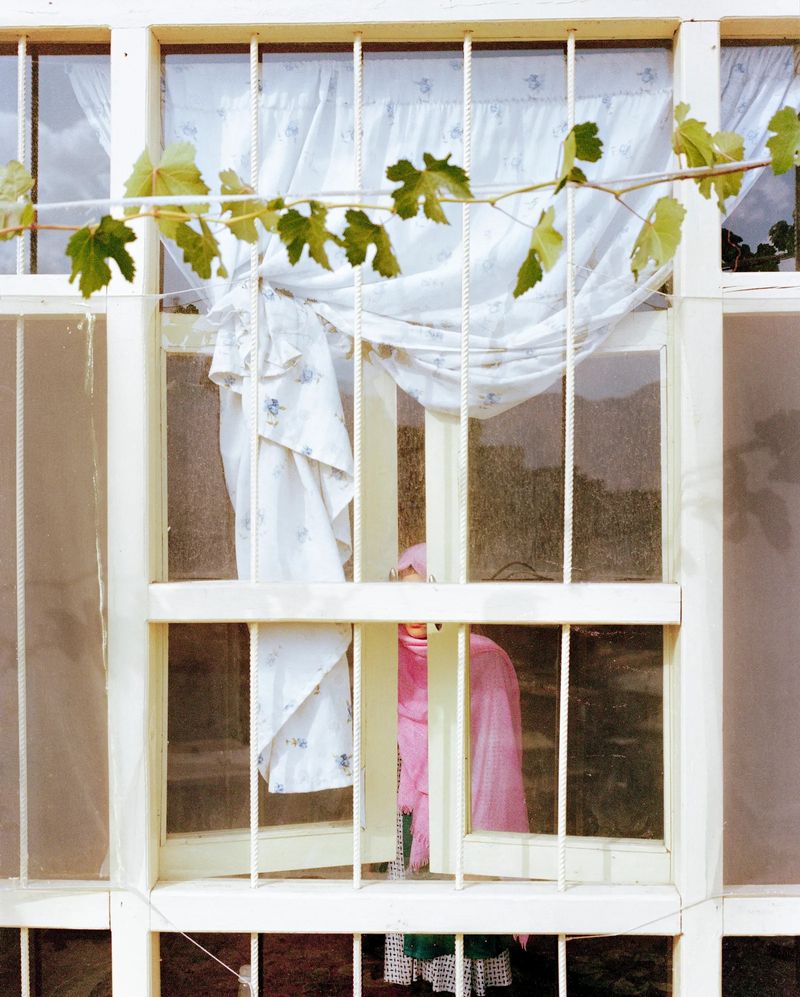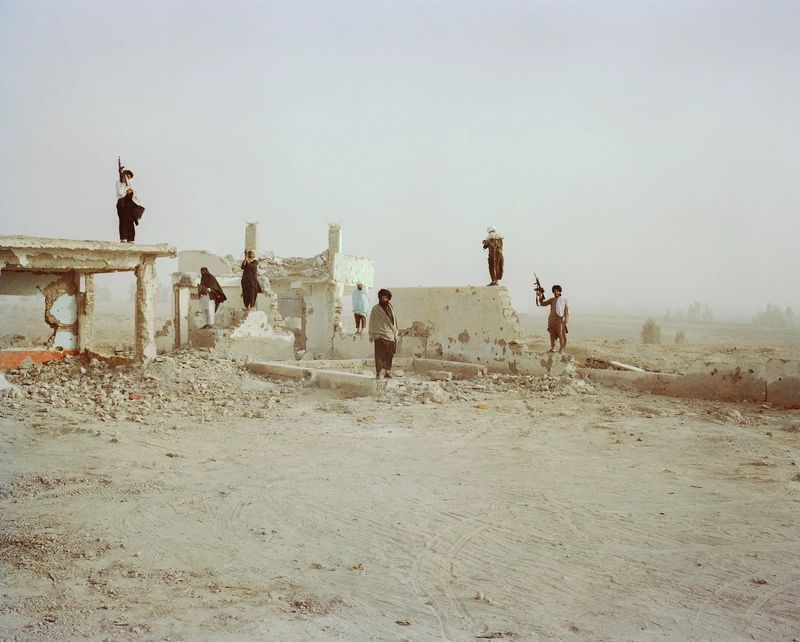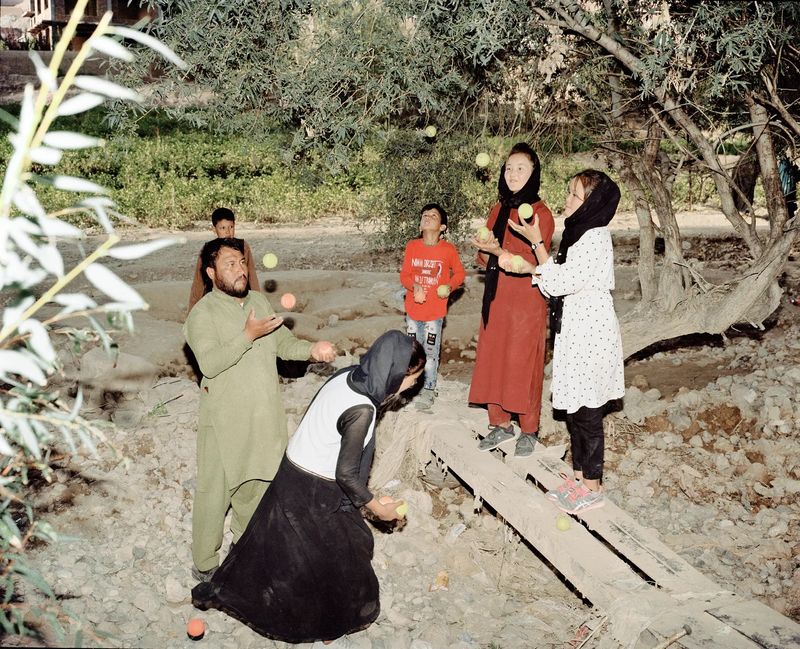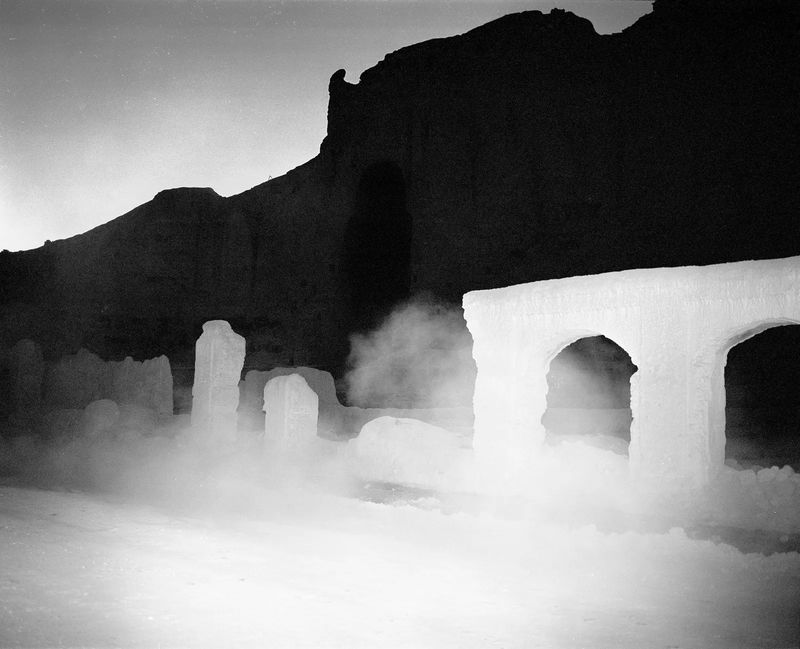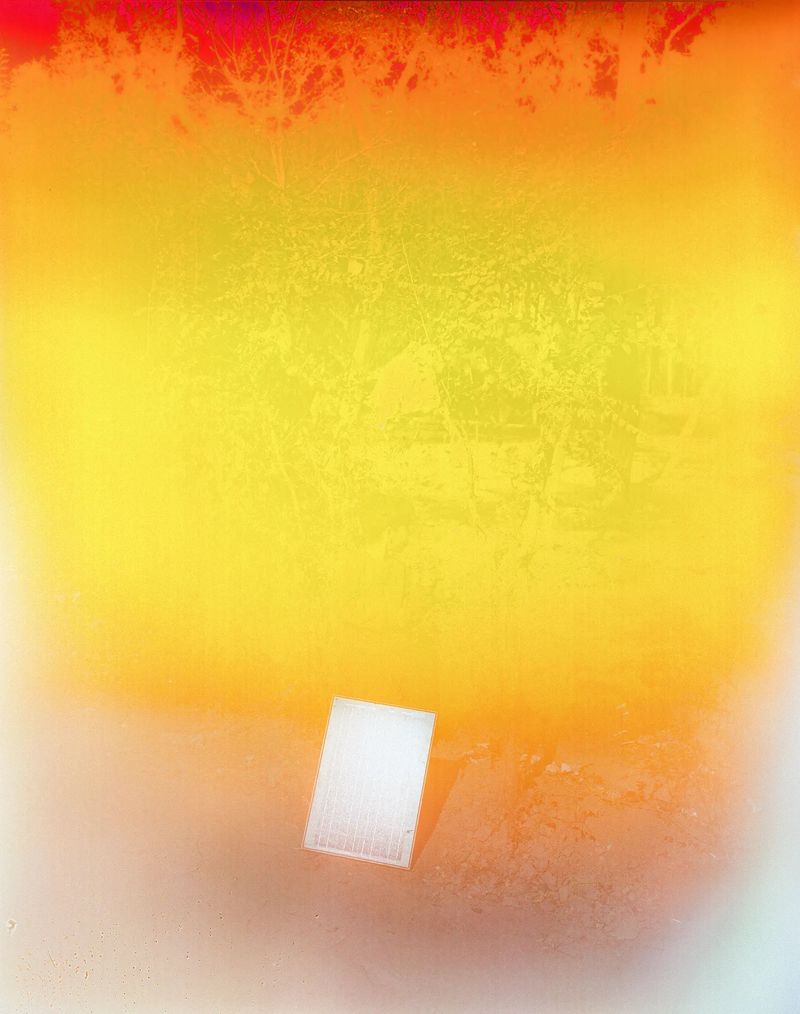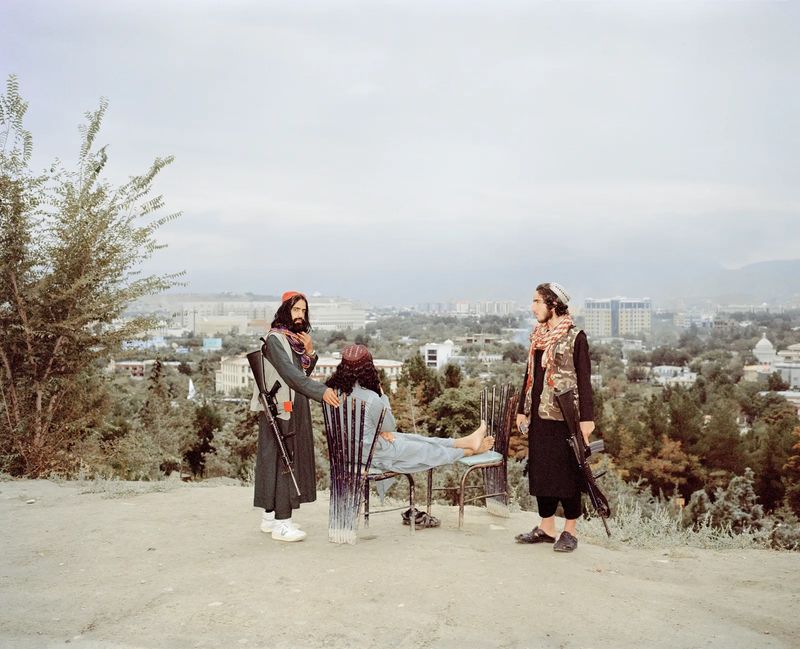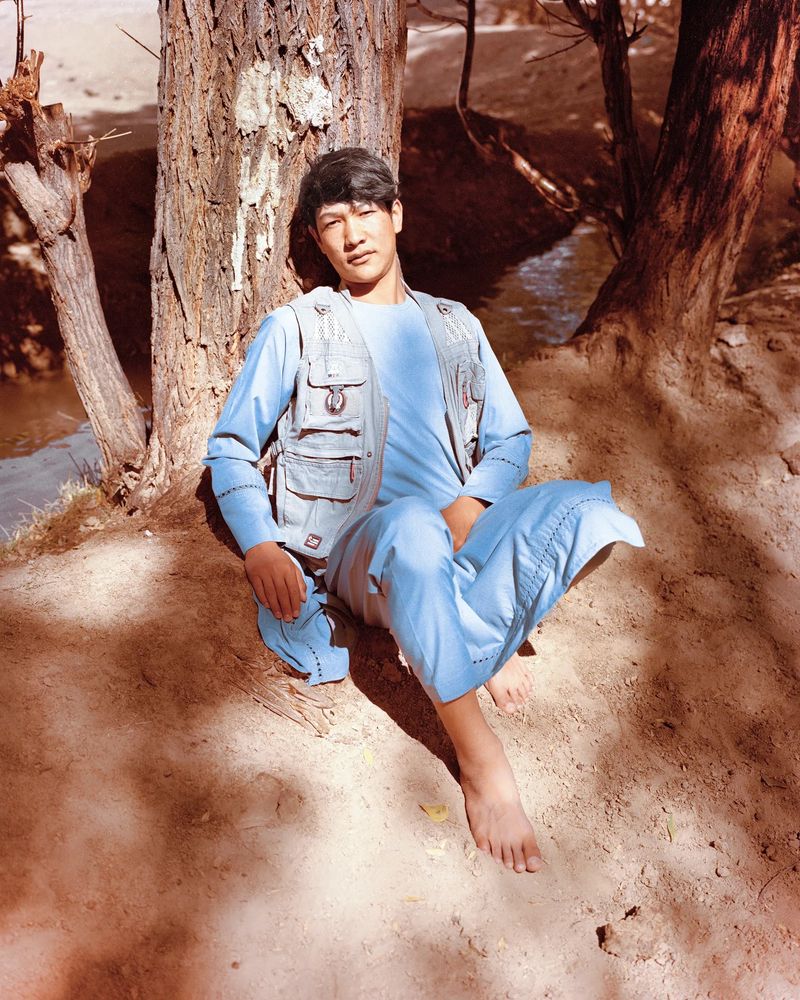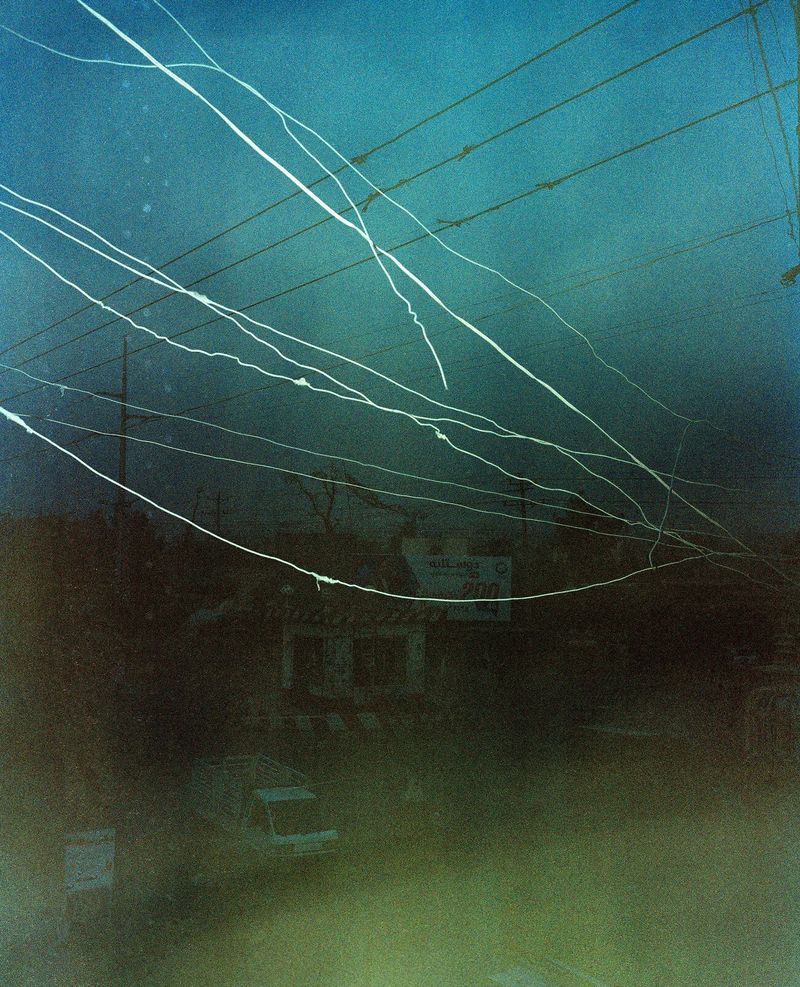Witness in the Shadows: Hashem Shakeri Documents Resilience in Taliban-Era Afghanistan
-
Published12 Jun 2025
-
Author
- Topics Contemporary Issues, Daily Life, Documentary, War & Conflicts
Hashem Shakeri’s images trace the fragility of Afghan life after the Taliban’s return to power, revealing lives suspended between uncertainty and survival—not as a story of defeat, but of humanity staring back from the void.
The act of staring returns—again and again. And soon, we too, the observers, are drawn into the photographer's singular gaze, channeled through the (hidden) eyes of a young girl leaning toward a window. Zahra opens just one panel—barely—partially veiled by a white curtain with blue flowers, knotted like a delicate drape. A row of vines frames the scene. Through the glass, we glimpse the outline of a city we cannot truly see—west of Kabul. But we can imagine what surrounds it: a metaphor for larger events—destroyed, ravaged, wounded.
Zahra, too, was wounded in a suicide attack by Taliban forces on her school; her friend was killed. Her gaze—obscured by the edge of the window frame—deceives us. It speaks of the impossibility of seeing, of imagining a brighter future perhaps. And yet, the open window lets life in—and lets her reach toward life.
A life that still pulses—tentatively, tenaciously—as Hashem Shakeri documents in this work, "Staring into the Abyss": delicate yet forceful. For months, Shakeri journeyed across Afghanistan after the Taliban's return to power, bearing witness to fragile life amid upheaval.
This photographic journey emerged from a moment of fracture. The roots of the project reach back to the Taliban's return in 2021, sparked by the resistance of Afghan women—whose defiance lit the path ahead. In 2022, as the Woman, Life, Freedom movement spread in Iran, a wave of solidarity united Iranians and Afghans, and Shakeri's work grew deeper. But in 2023, as that unity began to crack, he turned his gaze toward that fracture.
The philosophical framework borrows from Nietzsche's observation in its title—a line that captures the psychological toll of witnessing extreme upheaval. For Shakeri, this is more than metaphor.
"What I personally encountered and experienced in Afghanistan after the Taliban came to power was very abyss-like: uncertainty, darkness, and unending suspension," he says. Freedoms and achievements hard-won by people were undone. "It was like a black hole of ignorance that consumes all light and holds it within, with no clear end to how far it will devour."
But Nietzsche's warning carries a deeper resonance. The abyss is not just a warning; it is a quiet plea—for those who resist not to lose themselves.
"I hoped that we, living under a fundamentalist regime, would not become like the very system that oppresses us," he says.
This philosophy manifests in Shakeri's images. One photograph captures this aesthetic through the harsh glare of sunlight on a solar panel, rendering the scene surreal—a visual echo of the absurdity and desperation it contains. Ten-year-old Jamshid stood motionless for hours in the searing heat, guarding the panel from theft—a moment Shakeri describes as senseless yet symbolic. For him, it distilled the essence of that time in Afghanistan: a quiet, unrelenting stare into the abyss of circumstance.
The theme of suspension and uncertainty appears throughout his work. In another image, wires cut across the air as a ghostly presence. There is a sense of suspension—an eerie stillness—as the glimpse of a city corner appears almost spectral. It is dawn, the hour of quiet anticipation, as a new day begins—perhaps a different kind of day, though its promise remains uncertain. Shakeri captured this scene of the main square in Helmand from his room in the early weeks of the Taliban's return, just before sunrise, documenting a moment when the city, the country, and its people were undergoing profound transformation.
Throughout his journey, Shakeri encountered countless individuals whose stories became integral to his understanding of the country: wounded teenage girls who lost classmates in suicide bombings, who continue to studying in underground classrooms; a former military officer who hides in remote villages and refuses exile; a friend who meticulously searches his car for hidden bombs. He witnessed unspeakable tragedy hitting innocent lives—but also the enduring humanity that persists. His images become testaments to both:
"Every individual story opened up a new perspective, a new way of seeing," Shakeri reflects on the everyday life in Afghanistan—a place where "the line between life and death was thinner than a strand of hair, and where every second carried the possibility of the unpredictable."
Yet Shakeri's photographs speak less of the evils he witnessed, and more of the strength of those who lived through them.
This approach stems from his commitment to ethical documentation, working with people affected by years of conflict—a commitment that has made his work harder while heightening his responsibility to protect their dignity.
He avoided simplistic narratives, choosing instead to sit with nuanced complexity—even when that meant portraying Taliban fighters. But he insisted on seeing the full picture.
The complexity of Afghanistan extends beyond individual stories to encompass the scarred landscape. One photograph shows a cloud of dust rising, the contrast between light and shadow. The structures in the foreground are illuminated by the headlights of a passing vehicle, while the silhouette of the rockface looms behind. A menacing shadow emerges—a void that bears witness to a violent regime: the space where the Buddha statue once stood, carved into the heart of the mountain in Bamiyan.
This documentation led Shakeri to reflect critically on how the crisis has been framed internationally, as mainstream Western narratives have often minimized the U.S. role in Afghanistan's crisis, presenting sanitized versions of the story. He argues that responsibility for the country's situation lies with both internal factors and external forces, including imperialist policies that deepened these divisions.
But Shakeri's understanding of Afghanistan did not remain stagnant.
"In the beginning, like many others, my perception was filtered through images of war, oppression, and victimhood. But as the years passed, as I worked closely with individuals, listened to their stories, witnessed their resistance, and was invited into deeply personal and painful spaces, a far more complex, human, and layered picture of Afghanistan began to emerge."
This evolution in understanding shapes the purpose of his work.
Ultimately, Shakeri hopes that his photographs fosters a genuine openness to the "other," grounded in recognition of a shared humanity. "When audiences become more familiar with the details of people's lives and personalities," he says, "they no longer see them as distant, unfamiliar others." The experience of suffering, Shakeri reminds us, is universal. "It transcends all borders and divisions. Our freedom is intertwined with the freedom of others."
In this spirit, he hopes his photographs serve as both inspiration and testament to the quiet power of those who resist, who stand their ground against authority no matter what, and refuse to be unheard and dismissed. When systems grow distant from the lives they claim to serve, it is individuals who step forward—who speak, organize, and hold on to each other. "Perhaps my only hope is that these photographs can contribute to that counterforce, standing against power and continuing to push back," he says. There must always be something that pushes back—something steady, unyielding, human.
--------------
All photos © Hashem Shakeri, from the series Staring into the Abyss
--------------
Hashem Shakeri is an artist, photographer, and filmmaker from Tehran, Iran. He has been working on several long-term personal projects as well commissions as a documentary photographer and visual storyteller. Find his work on PhMuseum.
Lucia De Stefani is a writer and editor focusing on photography, illustration, and everything teens. She lives between New York and Italy. Find her on Instagram.
